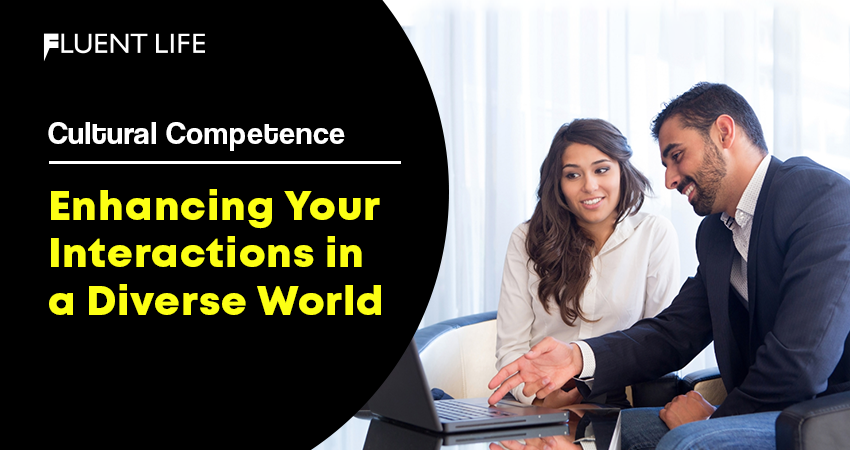Developing cultural competence skills are essential in today’s diverse world. It allows us to interact with people from different cultures, fostering understanding and respect. To do this, we must acknowledge our own biases and strive to dismantle them.
Realizing communication styles may vary across cultures is important. Non-verbal cues, like body language or eye contact, can mean different things. Thus, being aware of these nuances can prevent misunderstandings.
To enhance cultural competence, take time to learn about other cultures. Research customs, traditions, and beliefs. Plus, engaging in conversations with diverse backgrounds broadens knowledge and builds connections.
It’s essential to practice active listening when conversing with people from other cultures. Offer your full attention, demonstrate empathy, and avoid assumptions or interrupting. This shows respect for the speaker’s perspective and encourages open dialogue.
Cultivating self-awareness is vital to developing cultural competence skills. Reflect on your own cultural upbringing and biases. Acknowledging these biases allows us to approach conversations without judgment.
Enhancing cultural competence requires continuous learning and self-reflection. By valuing diversity and striving for inclusivity, we can create a harmonious, understanding world.
Understanding Cultural Competence Skills
Cultural competence is a must in our ever-diversifying world. It requires knowledge, skills, and the right attitude to collaborate with people from diverse backgrounds. It goes beyond merely being aware of different cultural norms. It means understanding how culture shapes values, beliefs, and behavior. We must learn about different cultures and their perspectives to develop empathy.
Adapting communication styles to fit different cultures is key. This includes being mindful of non-verbal cues, such as body language and eye contact. Also, we must be aware of language barriers and how it affects communication.
We must challenge our own biases and stereotypes. Cultural competence involves understanding others without judgment. By creating an inclusive mindset, everyone will feel valued and respected.
Pro Tip: Enhance cultural competence by getting involved in experiences like volunteering or studying abroad. These experiences will give you a deeper understanding of various cultures and expand your worldview.
Benefits of Cultural Competence Skills
Cultural competence offers many perks that make interactions in a multi-cultural world better. Knowing these benefits is key to having effective communication and forming meaningful connections across cultures.
- Improved Communication: Culturally competent people have the skills needed to talk to people from different backgrounds. They can read and interpret nonverbal cues, leading to better conversation and fewer misunderstandings.
- More Empathy: Cultural competence encourages understanding and appreciation of different experiences, values, and beliefs. This breeds stronger bonds and deeper relationships.
- Better Problem-Solving: Being culturally competent lets people look at issues from various angles. This helps problem-solving skills and creates unique solutions.
- Expanded Global Chances: In our connected world, cultural competence leads to more global job opportunities. Companies value employees who can manage diverse settings, making cultural competence a useful asset.
- Boosting Diversity and Inclusion: Culturally competent individuals promote diversity and inclusion in their communities. They help create spaces that embrace differences instead of excluding them.
Furthermore, developing cultural competence means learning about different cultures, languages, traditions, and customs. This learning lets people go beyond what they already know and understand other cultures better.
To make cultural competence even better, here are some ideas:
- Educate Yourself: Read books, articles, documentaries, or visit cultural events to learn about different cultures. This will expand your knowledge and make cross-cultural interactions smoother.
- Have an Open Mind: Approach conversations with interest instead of judgments. Welcome new ideas and look for similarities between us all as humans.
- Listen Actively: Listen attentively, ask questions for clarification, and don’t assume. This shows respect for the other person and enhances understanding.
- Embrace Diversity: Hang out with people from diverse backgrounds and cultures. This will open your eyes to new possibilities and let you learn from their experiences.
- Ask for Feedback: Get feedback from people from different cultures on how to improve cross-cultural interactions. Use this criticism to grow personally and professionally.
By following these steps, individuals can increase their cultural competence by engaging with different cultures, broadening their perspectives, and becoming better communicators in a diverse world.
Also Read: Master the Art of Small Talk: Engaging Conversation Tips
Developing Cultural Competence Skills
Cultivate cultural competence! Acknowledge and appreciate varying cultures, valuing their beliefs and practices. Take initiative: learn from books, articles, documentaries, and conversations with people from diverse backgrounds. Show genuine interest and respect in conversations. Reflect on biases and be open-minded to challenge and embrace a more inclusive mindset. Adapt communication styles when engaging in cross-cultural interactions.
Cultural competence promotes inclusivity and effective collaboration. It requires self-reflection and awareness of potential biases. It gained prominence as globalization accelerated, leading to cultural competency training programs.
Practical Strategies for Enhancing Cultural Competence
Embrace diversity and develop self-awareness for cultural competence. Show genuine curiosity and adapt communication styles. These four key approaches can help you navigate and interact with those from different backgrounds.
Understand power dynamics, address unconscious biases, and learn about historical context for further learning. Commit to ongoing learning to achieve cultural competence and create meaningful connections.
Don’t miss out on the opportunity to expand your cultural competence today!
Overcoming Challenges in Cultural Interactions
Cultural interactions bring challenges such as differing customs, norms, and beliefs. To tackle them, it’s key to gain cultural competency and understand different perspectives.
Effective communication is one way to do this. Listen carefully and remain open-minded to make connections with people from other cultures. Pay attention to non-verbal cues like body language and facial expressions too – they vary between cultures.
Misunderstandings can arise due to language or misinterpretation of gestures. Ask questions and get feedback to make sure everyone’s on the same page.
Educate yourself about different cultures too. Get to know their history, traditions, and values. Showing genuine interest in others’ cultures shows respect and builds inclusive relationships.
A good example of how to apply cultural competency is a businesswoman who traveled abroad. She didn’t know the customs, but she learned some basic greetings in the local language. This was appreciated by her hosts – and their partnership flourished.
Also Read: The Role of Humor in Engaging English Conversations
Taking Cultural Competence Skills to the Next Level
Go to the next level with Cultural Competence! Embrace unique details like traditions, customs, and values when interacting with different cultures. Here’s how to get started:
- Education: Learn about different cultures with courses, workshops, and reading materials. Stay informed about current events.
- Communication: Practice active listening and mindful non-verbal cues. Avoid stereotypes.
- Empathy: Put yourself in someone else’s shoes and understand their perspective. Respect cultural differences.
- Collaboration: Work with individuals from diverse cultural backgrounds. Diversity brings strength!
Now is the time to explore. Step out of your comfort zone and expand your horizons. Enhance your own cultural competence while making a positive difference in our increasingly diverse world. Don’t miss this opportunity to become a more culturally competent individual. Join us on this journey of growth and understanding!
Conclusion
Wrapping up this talk, it is clear that cultural competence is essential in our ever-diversifying society. By embracing different points of view and understanding them better, we can make our interactions more inclusive.
Talking with people from varied backgrounds can open up our minds and give us valuable insights into their lives. This helps us challenge our own biases and preconceived notions, leading to smoother conversations and collaborations.
Being culturally aware also allows us to handle cross-cultural scenarios with sensitivity and respect. By knowing more about the norms, values, and customs of each culture, we can avoid any miscommunication or offense. This can help build harmony in communities and make everyone feel included.
One incredible example of how cultural competence can affect society is the civil rights movement in the US. In spite of deep racial tensions, activists like Martin Luther King Jr. fought for equal rights through peaceful protests and speeches. Their ability to relate and connect with many different types of people was instrumental in bringing about social reform and ending institutional discrimination. Know More – The Fluent Life
Frequently Asked Questions
Q1: What is cultural competence?
A: Cultural competence refers to the ability to understand, communicate, and interact effectively with individuals from diverse cultural backgrounds. It involves respecting and valuing different perspectives, beliefs, and practices, and adapting one’s behavior accordingly.
Q2: Why is cultural competence important?
A: Cultural competence is essential in today’s diverse world as it promotes inclusivity, understanding, and harmony among people from different cultures. It helps to bridge cultural gaps, reduce misunderstandings, and allows for more effective communication and collaboration.
Q3: How can I improve my cultural competence?
A: To enhance your cultural competence, you can engage in activities such as learning about different cultures, attending cultural events, seeking diverse perspectives, practicing active listening, and challenging your own biases and stereotypes. Taking cultural sensitivity training or courses can also be beneficial.
Q4: What are some common challenges in achieving cultural competence?
A: Some common challenges in achieving cultural competence include language barriers, cultural norms and values that differ from one’s own, lack of cultural awareness, stereotypes, prejudices, and unconscious biases. It requires ongoing learning, self-reflection, and open-mindedness to overcome these challenges.
Q5: How does cultural competence contribute to personal growth and professional success?
A: Cultural competence fosters personal growth by expanding one’s mindset, empathy, and understanding of the world. It enhances communication skills, promotes teamwork, and facilitates effective interaction with diverse individuals. In a professional setting, cultural competence is highly valued as it allows for more inclusive leadership, decision-making, and the ability to work collaboratively in increasingly diverse workplaces.
Q6: How can organizations promote cultural competence?
A: Organizations can promote cultural competence by providing diversity training programs, encouraging multicultural collaboration, fostering an inclusive work environment, establishing policies and practices that embrace diversity, and promoting cultural awareness and education among employees. These efforts can help create a culturally competent organization that values and respects the diversity of its workforce and customers.






